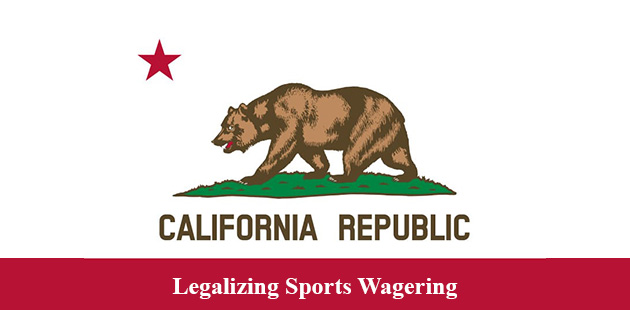Los Angeles Sports Betting Industry Preparing for 2022 Vote
California flag photo courtesy of the state government
If you live in California and like sports betting, that is wagering on your favorite sports, you can either go to Nevada and spend money and time getting to and staying at a casino-resort, or, if you’re in Sothern California, head down to Tijuana, Mexico. The Los Angeles sports betting (betting.us) industry is preparing to change all that next year.
A ballot initiative has qualified for the November 8, 2022 election, giving voters the opportunity to amend the state constitution to allow sports betting, along with certain table games like roulette and craps, for Indian casinos and race tracks.
One aspect of the measure that some California bettors might find disheartening: Gambling on events with California-based college teams would not be allowed. And of course betting on high school sports would still be banned.
In 2019 The Coalition to Authorize Regulated Sports Wagering (CARSW) was formed to push for the ballot initiative. The state has been missing out on the lucrative tax revenue that can be raised from sports wagering and the initiative, if passed, would have a 10% tax from tribal casinos and race tracks alike.
CARSW was given a deadline to raise the required number of signatures to put the measure on the ballot for 2022, but then received an extension after COVID-19 pandemic hit and lockdowns were occurring across the state. On December 14, 2020 CARSW filed with the office of the California Secretary of State 1,427,373 signatures and then on May 26 of this year the California Secretary of State Shirley Weber announced the measure had qualified for the November 2022 ballot. The initiative needed 997,139 to qualify and the various counties in the state verified 1,061,282 were valid.
Many of the state’s tribal communities support the measure as it gives their casinos more options for wagering. According to Ballotpedia, “the Pechanga Band of Luiseno Indians, Yocha Dehe Wintun Nation, Federated Indians of Graton Rancheria, San Manuel Band of Mission Indians, and Agua Caliente Band of Cahuilla Indians. The campaign had raised $11.57 million through March 31, 2021. Mark Macarro, chairman of Pechanga Band of Luiseño Indians, stated, ‘Californians should have the choice to participate in sports wagering at highly regulated, safe and experienced gaming locations. We are very proud to see tribes from across California come together for this effort, which represents an incremental but important step toward giving Californians the freedom to participate in this new activity in a responsible manner.’”
Opponents of the measure launched an effort to stop the initiative, No on the Gambling Power Grab PAC, but that organization folded late last year after raising $1.09 million. Kyle Kirkland, president of the California Gaming Association said the measure does nothing to advance sports wagering and just expands the tribal casinos’ tax-free monopoly on gambling. He accuses the tribal casinos of prioritizing their profits over public safety.
California is one of 21 states that currently do not allow sports wagering. Should this bill pass the California Constitution will be amended to allow such gambling in the state.
Sports wagering is big business throughout the United States, whether people travel to other states or they do it online. California will put itself into that market if the measure passes and the state could begin seeing the tax revenue the following year. Obviously places like Nevada are not very keen on the measure, but cities like Las Vegas, Reno-Lake Tahoe and Laughlin offer a range of entertainment options the California tribal casinos cannot, so millions of Californians will still flock to Nevada for weekends and holidays.
What the ballot measure does not address is online gambling, which will still be banned in California. Hundreds of millions of dollars are wagered on major sporting events, much of it online. Internet gambling sites are easy to find and sports book handicapping is readily available via the internet. Gamblers can find information for every horse race, dog race, plus all major sports like the NBA, NHL, MLB and NFL on the internet, so whether they place their bets online or do so in a casino setting or race track, people that like to wager on sports can be well informed.
Two other measures will be on the November 2022 ballot, one to raise the cap on noneconomic damages in medical malpractice lawsuits and another to veto the initiative that banned flavored tobacco products.

Tim Forkes started as a writer on a small alternative newspaper in Milwaukee called the Crazy Shepherd. Writing about entertainment, he had the opportunity to speak with many people in show business, from the very famous to the people struggling to find an audience. In 1992 Tim moved to San Diego, CA and pursued other interests, but remained a freelance writer. Upon arrival in Southern California he was struck by how the elected government officials and business were so intertwined, far more so than he had witnessed in Wisconsin. His interest in entertainment began to wane and the business of politics took its place. He had always been interested in politics, his mother had been a Democratic Party official in Milwaukee, WI, so he sat down to dinner with many of Wisconsin’s greatest political names of the 20th Century: William Proxmire and Clem Zablocki chief among them. As a Marine Corps veteran, Tim has a great interest in veteran affairs, primarily as they relate to the men and women serving and their families. As far as Tim is concerned, the military-industrial complex has enough support. How the men and women who serve are treated is reprehensible, while in the military and especially once they become veterans. Tim would like to help change that.

